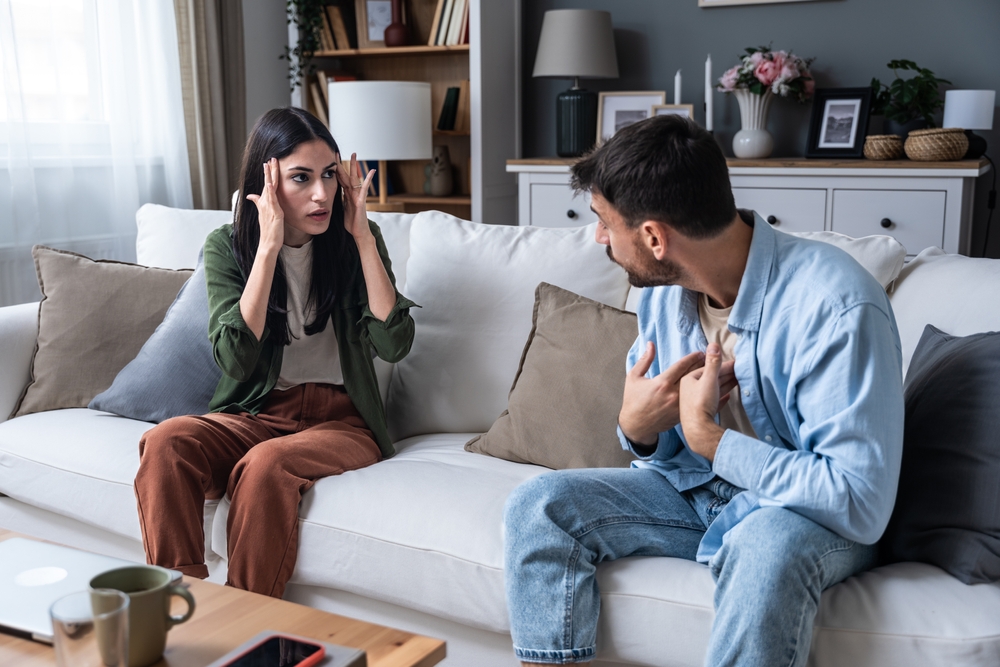People who grew up in unpredictable or chaotic homes often carry emotional and psychological patterns that affect their adult lives. These individuals may find comfort in noise, tension, or urgency because that was their version of normal. As adults, they might say they want peace, but when life becomes calm, they often feel uneasy or suspicious. This experience is not about choice or preference. It is about conditioning. The brain and nervous system become wired for high-alert living. Over time, that becomes a familiar and automatic way to navigate the world. Peace, which others see as relaxing, can feel unfamiliar or unsafe.
Hypervigilance Becomes a Lifelong Habit

In a chaotic environment, children often learn to stay alert at all times. They scan for danger, monitor moods, and prepare for the unexpected. This state of hypervigilance keeps them physically tense and mentally on edge. As adults, this habit does not just disappear. Even in calm situations, they may feel a need to stay alert. They are used to expecting conflict or crisis. When peace enters their lives, their nervous system may stay in a defensive state. The body resists calm because it is not used to it. Living this way can lead to stress-related issues, sleep problems, and emotional burnout.
Calm Can Feel Foreign or Even Dangerous

Peace can be deeply uncomfortable for someone raised in chaos. A quiet room might feel eerie. A healthy relationship might feel too stable. This reaction comes from a brain that was trained to expect problems. People who lived through unstable childhoods often associate peace with the calm before the storm. Their instincts may tell them that something bad is about to happen. This fear can cause them to self-sabotage, create conflict, or retreat from calm environments. It is not that they dislike peace. It is that peace feels unpredictable and therefore threatening. Their mind is still seeking the safety that chaos once promised.
Trust Is Difficult When You Grew Up Without It

Trusting others is hard for people who grew up in unpredictable or unsafe homes. They may have learned that people can change without warning, make promises they never keep, or behave lovingly one moment and harshly the next. As adults, they may struggle to let their guard down. They might test people, overanalyze conversations, or assume that kindness hides an agenda. When life feels too good or people seem too nice, they may become suspicious. This fear of trust makes it difficult to settle into peaceful relationships. They may feel more secure in environments that mirror the unpredictability of their upbringing.
They May Mistake Peace for Boredom

People raised in chaos often connect excitement with emotional highs and lows. When life is calm and routine, it might feel boring or even lifeless. Peace lacks the intensity they are used to. They might crave conflict or drama just to feel something. These feelings are often misunderstood as a preference for chaos, but they are usually a result of emotional conditioning. Their body and brain may not know how to interpret calm without stimulation. Without some kind of tension, they may feel disconnected or numb. This confusion can drive them to seek out situations that create the emotional spikes they are used to.
Emotional Regulation May Not Come Naturally

A chaotic childhood often involves unpredictable emotions from caregivers. Children in these situations do not always learn how to identify or manage their feelings. As adults, they may become overwhelmed by strong emotions and struggle to calm themselves. They might react impulsively, avoid feelings altogether, or rely on external things to feel okay. In peaceful environments, where emotional stability is expected, this lack of regulation can feel frustrating or isolating. They might feel out of place or ashamed. It is not that they do not want peace. It is that they were never taught how to live within it comfortably.
Their Identity Can Be Tied to Survival Mode

For many people raised in chaotic households, survival becomes part of their identity. They learn how to manage crisis, take care of others, and fix problems from a young age. These traits often turn into adult strengths, like resilience and resourcefulness. But when peace arrives and survival is no longer needed, they may feel lost. Without conflict to resolve or people to protect, they might question their worth. Peace strips away the familiar roles they once played. This loss of identity can create a sense of restlessness. They may not know who they are without the struggle they once depended on.
Healthy Relationships Can Feel Too Easy

Romantic and social relationships built on mutual respect, honesty, and emotional safety can feel uncomfortable at first. People raised in chaos may expect manipulation, power struggles, or emotional withdrawal. When none of that happens, they might assume something is wrong. They may interpret healthy communication as boring or emotionally flat. This can lead to pushing people away or choosing partners who recreate the familiar chaos. It is not that they do not want love. It is that love without pain feels foreign. The challenge lies in learning to accept that healthy relationships can exist without conflict or tension.
Read More: If You Felt Invisible Growing Up, These 9 Feelings Might Still Haunt You Today
Stillness Can Trigger Anxiety

Peace often involves stillness. It requires moments of silence, reflection, and slowness. For someone raised in a loud or chaotic home, stillness can trigger discomfort. Without constant noise or action, their mind may wander to old fears or painful memories. The lack of distraction can amplify inner turmoil. This makes rest and relaxation difficult. Meditation, for example, may feel unbearable. They may avoid downtime or fill it with busy work, screen time, or other distractions. The goal is not to avoid peace but to build tolerance for stillness over time. Learning to be with themselves calmly is a major milestone in healing.
They May Create Conflict Without Realizing It

Some people who grew up in unpredictable homes develop a subconscious pattern of creating chaos. When life feels too calm, they may start arguments, stir drama, or make impulsive choices. This pattern is not about causing harm. It is a way of restoring a familiar emotional state. It feels safer to be in control of the chaos than to be caught off guard by it. This behavior can create instability in relationships and work environments. Recognizing this habit is the first step to breaking it. With self-awareness, they can learn new ways to manage uncertainty without creating unnecessary conflict.
Healing Takes Time and Patience

The good news is that people who grew up in chaos can learn to enjoy peace. It is a process that takes time, self-awareness, and often support from trusted individuals. The nervous system can relearn calm. The brain can build new connections. Emotional patterns can shift. It may start with small moments of peace that feel strange at first but slowly become more familiar. As they learn to trust stability, peace begins to feel safe instead of threatening. Healing is not about erasing the past. It is about creating new experiences that teach the mind and body a different way to live.
Read More: Five Myths We Used To Believe About The Effects of Childhood Trauma
The Path to Peace Starts with Understanding

Understanding why peace feels uncomfortable is the first step toward changing the relationship with it. Once people realize that discomfort in calm situations is not a personal flaw but a learned response, they can begin to reshape their emotional world. By gently exposing themselves to peace in small ways, building healthy relationships, and learning emotional regulation, they create a new normal. Over time, peace becomes less foreign and more familiar. It stops feeling like a threat and starts to feel like home. The journey from chaos to calm is not easy, but it is possible for anyone willing to take the first step.
Disclaimer: This information is not intended to be a substitute for professional medical advice, diagnosis or treatment and is for information only. Always seek the advice of your physician or another qualified health provider with any questions about your medical condition and/or current medication. Do not disregard professional medical advice or delay seeking advice or treatment because of something you have read here.
Disclaimer: This article was created with AI assistance and edited by a human for accuracy and clarity.
